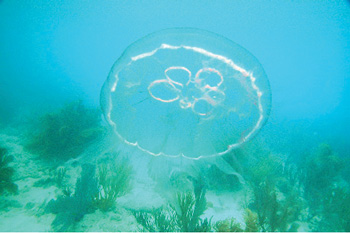No bones about it; jellyfish bad news

PHOTO PROVIDED/FLORIDA FISH AND WILDLIFE
CONSERVATION COMMISSION
The moon jellyfish is common off Anna Maria Island,
and has a mild sting.
They have no backbone, no brains and no heart, which is probably why a jellyfish can sting the living daylights out of you without missing a beat.
It was a box jellyfish – not the sharks that she took elaborate precautions against – that thwarted long-distance swimmer Diana Nyad from her lifelong dream of swimming from Cuba to Florida last month.
And despite two shark attacks in the past two weeks off Anna Maria Island, it's more likely you'll encounter a jellyfish than a shark in local waters.
The box jellyfish is the most dangerous and lives in local waters, although it is not common, according to Dr. Ernst Peebles, associate professor at the University of South Florida's College of Marine Science in St. Petersburg.
"The one that stings people most around here is the sea nettle," he said.
It's easy to spot, with brown or rust-colored radiating lines that form a sunray pattern. If you see it, just keep swimming – in the opposite direction.
If you see a beautiful purple and pink floating balloon, keep on swimming at warp speed. The Portuguese man o' war has tentacles up to 50 feet long and can still sting you even when it's lying dead on the beach. They occasionally show up locally, but are not common, as they prefer deep ocean currents.
Purple doesn't always mean panic time. Moon jellyfish sometimes have a purplish tint, but are mostly clear, with a four leaf clover pattern, and they deliver a much milder sting with their shorter tentacles. However, like vacationers on a Segway tour, they travel in groups, so when you see one, count on more nearby, increasing your odds of getting stung.
Every once in a while a real monster shows up in channels on the north end of Anna Maria Island, usually in the spring, Peebles said – the lion's mane jellyfish looks like a bucket-sized chunk of floating pink attic insulation, but is far more irritating to the skin with its painful sting.
When jellyfish sting, they shoot darts into your skin that are connected back to the jellyfish's body, and they pump venom into your blood vessels, he said. Some people are mildly sensitive to the venom and some are seriously allergic to it. Box jellyfish stings can be lethal.
That's what brought Nyad out of the water. Later, she commented that jellyfish populations are exploding, possibly due to global warming.
There's something to that, Peebles said – upside-down jellyfish from the Florida Keys have been seen as far north as Sarasota County due to climate changes making the water warmer.
Jellyfish like warm water and are more common in warmer months because there's more food available then, but they're here all year around, Peebles said.
There is a global concern about increasing jellyfish numbers for other reasons than global warming, he said, including changes in the food web due to fertilizer runoff and overfishing.
Jellyfish populations also can boom in areas where water doesn't circulate well, he said, like the canals on the bay side of Anna Maria Island – yep, they thrive in Sarasota Bay and the Intracoastal Waterway, too.
So do sharks.
Shark experts say you can make it less likely a shark will bite you by not being in the water while you're fishing, which both recent victims had been doing.
If you're fishing in a shark's territory, and you never know when you may be in one's territory because they are constantly moving remember, "The shark sees you as a competitor for its food, and he'll give you a bite to scare you off," Peebles said. "They'll punish you for disrespecting their space."
Jellyfish, on the other hand, can't see you and have no vindictive or any other kind of thoughts, although they may appear to be chasing you because they can swim by pulsing their umbrella.
If you don't get away in time and you get stung, use vinegar, ammonia or papain (in Adolph's meat tenderizer), and be prepared to have a painful, sometimes itchy welt for a while, Peebles said. He added that if you get a tentacle stuck in you, don't rinse it off, because it will cause other stings. Instead, lift it straight off.
"At least we don't have it as bad as they do in Australia," he said, where they put up nets around swimming areas to screen out large jellyfish, and swimmers wear stinger suits, like wetsuits, to avoid the dozens of kinds of stinging jellyfish.

